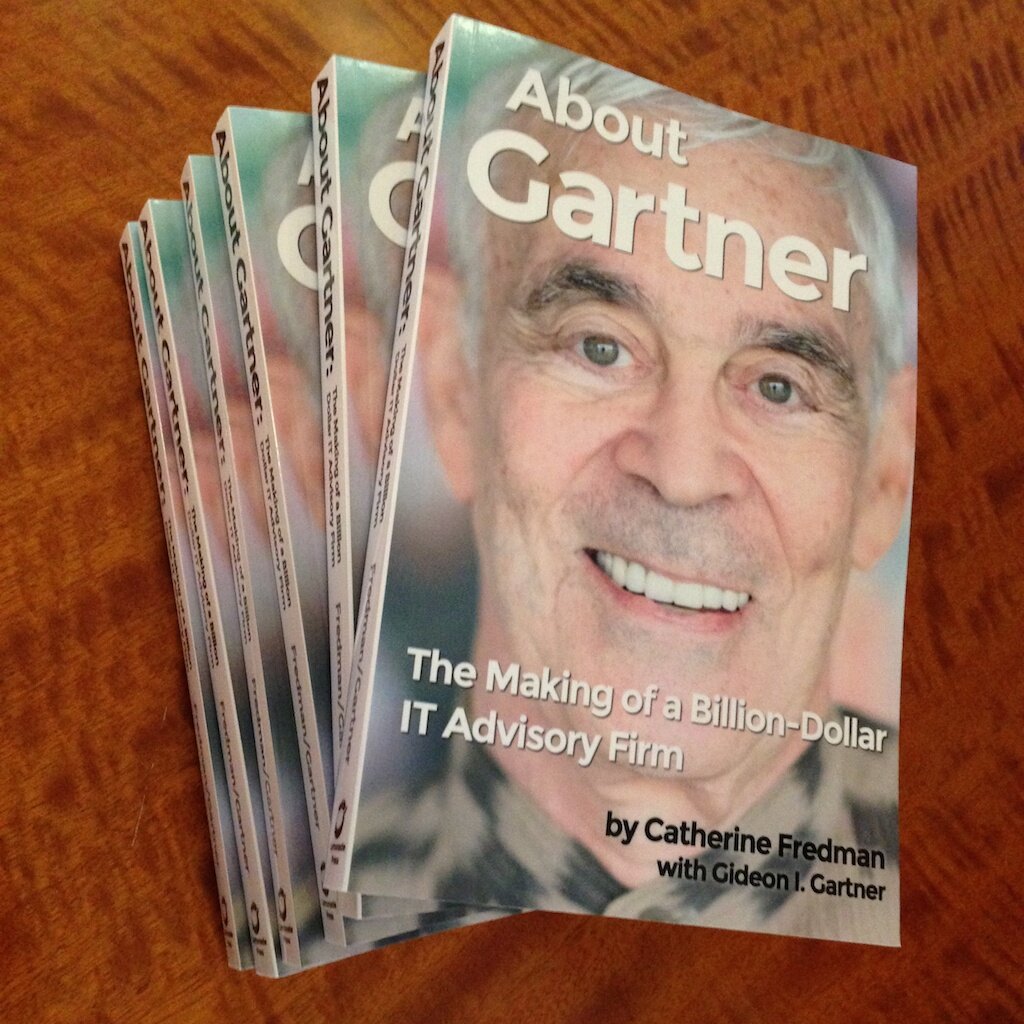This is a story presented in two parts…
The material below describes the visit of the CEO and officers of a very large company (all of whom will be nameless), when the firm was bidding to acquire our company from Saatchi, despite our resistance.
Gartner and 10 other consultancies were put on the auction block by Saatchi & Saatchi in June 1989, and in late October one of the firms which made a play for us, a large firm’s high powered CEO and staff visited (I’m withholding their names). The CEO was a distant acquaintance of mine, previously thoughtful and a potential friend, but I was increasingly angry because he had the idea to acquire our company after apparently condoning some extreme badmouthing by a senior executive of his, conceivably with the intent of influencing Saatchi to lower its Gartner ‘asking price’. When I was asked to enter the conference room to begin the due diligence process with my normal Gartner Facts presentation, I could barely get myself to do so because the bad-mouthing had disturbed our entire professional staff and I was not sure how this visit would evolve. This company wished to buy us and we wanted no part of that, as we were working hard to structure a Management or Leveraged-Buy-Out. I hung back in my office, with the absurd hope that the visitors might vanish; but when reality set in, I finally entered the room shaking somewhat, perfunctorily shook the hands of the people and sat down; an eternity of seconds passed with no one speaking, a sign of general discomfort.

A Deal with the Devil
A dozen of our most senior executives and producers were in the room. The visiting CEO broke the silence, opening the day with an expected apology, but a rather soft attempt to gloss over what happened.
“I’m afraid I cannot accept your apology,” I replied in front of all six people on the CEO’s staff, “seems to me the time to apologize was a month ago,” I continued.
“Sorry, you’re quite right, but I was out of the country,” replied the CEO (he did travel constantly doing deals).
“Didn’t anyone in a position of authority see the first ad in time to pull the second?” I said, sounding incredulous.
“No,” he replied, getting off the hook with a short answer.
“Is the perpetrator of the badmouthing an officer of your company?” I’m sure this began to sound like an interrogation, no way to treat guests. And we knew who the perpetrator was!
“He’s the president of one of your subsidiaries? Is he still there ?”
“Yes, he’s still there, he’s is the president of one of our companies, and I told him not to repeat the incident.” (He was removed, but three years later!)
Later in the day when the issue came up again, I told the CEO that in our environment an individual who showed that level of misjudgment would be out of the business in a week. Separately, Grigs Markham our CFO, in a display of super-articulateness, described directly to the full audience how he could not in good conscience ever consider working for a company populated with people such as he understood it to employ.
And yet the CEO, appearing insensitive to the situation and wearing a half-smile throughout the proceedings (even when our people were attacking his company) incredibly said, “the people who put the ad in didn’t know that we were bidding for the company”…as though the only reason they would not have put both ads in was if they knew that their firm was bidding to buy us!
“And you haven’t responded to the letters which our lawyers sent?” My voice sounded disembodied, this whole scene was strange, the CEO was supposed to be questioning us! I had to get our feelings out on the table even if they poisoned the air, or perhaps subconsciously in order to poison the air; but I certainly had no concrete motivation to do so, my words just flowed.
“Yes, we did respond” said he, and later that day I had his letter finally sent to me by our lawyers, a totally inadequate and absurd ‘Lawyer’s’ letter which did not contain an ounce of apology. In fact the letter continued to assert, against the obvious, that the facts stated in the advertisements were correct and were public knowledge! So his firm did not (at least officially) feel one ounce of contriteness over this incident. This raised our sensitivities to looking these people in the eye to such an unacceptable extent that we would later challenge the CEO directly and accuse his firm of complete inadequacy as a pretender to the purchase of our company; but his strong persona remained unflappable, probably the only way he could handle this most difficult session.
I then turned to Saatchi’s investment banker (Blackstone’s Bill Pate who was Steve Schwartzman’s right-hand man) and asked, “Bill, what’s next?” Bill went through the agenda and I began my presentation about the history and status of Gartner Group. Questions from the floor all came from the boss, none of his senior staff spoke as he sought to understand every nuance of our business with the others afraid to even peep in the presence of their leader.
I answered as forthrightly as I could, but at one point turned to the Blackstone people and said, “We’re giving away the store! They are asking all about our strategies, they are taking notes, and this is not helpful!” Nevertheless we continued suffering this meeting. In fact, I knew that this company could never adopt our strategies and incorporate them into the their various companies. Nor would it likely wish to.
Read Part II







3 Comments